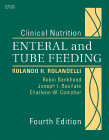Introduction
Chapter 1 Rationale for the Multidisciplinary: Approach to Clinical Enteral
Nutrition - Physiology of the Alimentary Tract
Chapter 2 Motility, digestion, absorption
Chapter 3 Barrier Function
Chapter 4 Gene expression and nutrients
Chapter 5 Nutrition Across Animal Species: Nutrient Metabolism
Chapter 6 In Pregnancy and Lactation
Chapter 7 In Children
Chapter 8 In the Elderly
Chapter 9 In response to acute and chronic illness
Chapter 10 Fluid and Electrolytes
Chapter 11 Macronutrients
Chapter 12 Vitamins
Chapter 13 Minerals and Trace Elements
Chapter 14 Non-nutritive Dietary Supplements: Fiber
Chapter 15 Wound Healing: Principles of Enteral Nutrition
Chapter 16 Nutrition Assessment/Nutrition Focused H&P
Chapter 17 Access to the GI Tract
Chapter 18 Enteral Formulations
Chapter 19 Immunonutrition
Chapter 20 Administration of Enteral Nutrition ?Initiation, Progression,
Transition
Chapter 21 Dietary Supplements in Nutrition Support
Chapter 22 Pre-, Pro-, and Synbiotics
Chapter 23 Monitoring for Efficacy, Complications and Toxicity
Chapter 24 Pharmacotherapeutic Issues
Chapter 25 Reimbursement Issues
Chapter 26 Pediatric Critical Illness
Chapter 27 EN in the Home (Ambulatory and Office management?: Disease Specific
Chapter 28 Burns
Chapter 29 Trauma
Chapter 30 Sepsis
Chapter 31 Head and Spinal Injury
Chapter 32 Cardiac Surgery
Chapter 33 Severe Obesity in Critically Ill Patients
Chapter 34 Neurologic Impairment
Chapter 35 Acute Pulmonary Disease
Chapter 36 Chronic Pulmonary Disease
Chapter 37 Acute Pancreatitis
Chapter 38 Chronic Pancreatitis
Chapter 39 Short Bowel Syndrome
Chapter 40 Acute Hepatic Dysfunction
Chapter 41 Chronic Renal Dysfunction
Chapter 42 HIV Infection
Chapter 43 Diabetes
Chapter 44 Head and Neck Cancer
Chapter 45 Esophageal/Gastric/ Pancreatic Cancer
Chapter 46 Intestinal Transplant
Chapter 47 Liver Transplant/Chronic Liver Disease
Chapter 48 Hematopoetic Stem Cell Transplant (BMT)


